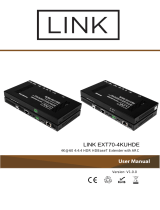
2
IMPORTANT SAFETY INSTRUCTIONS
To reduce the risk of re or electric shock, read and follow all instructions and warnings in this
manual. Keep this manual for future reference.
1. Do not expose this apparatus to rain or moisture. Do not expose this equipment to dripping
or splashing, and ensure that no objects lled with liquids, such as vases, are placed on the
equipment. Do not use this apparatus near water.
2. Do not remove cover. No user serviceable parts inside.
3. Clean only with a dry cloth.
4. Do not block any ventilation openings. Install according to manufacturer’s instructions.
5. Do not install near any heat sources such as radiators, heat registers, stoves or other
apparatus (including ampliers) that produce heat.
6. Do not override the safety purpose of the polarized or grounding plug. A polarized plug has
two blades, one of which is wider than the other. A grounding plug has two matching blades
and a third grounding prong. The wide blade or the third prong is provided for your safety. If
the provided plug does not t into your outlet, consult an electrician for replacement of the
obsolete outlet.
7. Protect the power cord from being walked on or pinched, particularly at the plug end and
where the power cord is attached to the apparatus.
8. Only use attachments and accessories specied by the manufacturer.
9. Refer all servicing to qualied service personnel. Servicing is required when the apparatus
has been damaged in any way, such as when the power supply cord or plug is damaged,
liquid has been spilled on or objects have fallen into the apparatus, the apparatus has
been exposed to rain or moisture, the apparatus does not operate normally, or it has been
dropped.
10. To completely disconnect this equipment from power, disconnect the power supply cord
from the power outlet.
The lightning flash with arrowhead symbol, within
an equilateral triangle, is intended to alert the user
to the presence of uninsulated dangerous voltage
within the product’s enclosure that may be of
sufficient magnitude to constitute a risk of electric
shock to persons.
The exclamation point within an equilateral
triangle is intended to alert the user to the
presence of important operating and maintenance
(servicing) instructions in the literature
accompanying the appliance.
CAUTION
CAUTION: TO REDUCE THE RISK OF
ELECTRICAL SHOCK.
DO NOT REMOVE COVER. NO USER
SERVICEABLE PARTS INSIDE.
REFER SERVICING TO QUALIFIED
SERVICE PERSONNEL.























